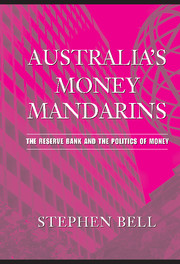Book contents
- Frontmatter
- Contents
- List of Illustrations
- Preface
- Abbreviations
- Introduction
- 1 Slowly Building the Reserve Bank
- 2 Into the Monetary Policy Wilderness
- 3 Snapping the Stick of Inflation
- 4 ‘A Measure of Peace’? Monetary Policy in the 1990s
- 5 Towards RBA Independence
- 6 RBA Independence – Why?
- 7 Should the RBA Be Independent?
- 8 Internal Governance and the Board
- 9 New Challenges in a World of Asset Inflation
- Conclusion
- Notes
- References
- Index
Conclusion
Published online by Cambridge University Press: 06 October 2009
- Frontmatter
- Contents
- List of Illustrations
- Preface
- Abbreviations
- Introduction
- 1 Slowly Building the Reserve Bank
- 2 Into the Monetary Policy Wilderness
- 3 Snapping the Stick of Inflation
- 4 ‘A Measure of Peace’? Monetary Policy in the 1990s
- 5 Towards RBA Independence
- 6 RBA Independence – Why?
- 7 Should the RBA Be Independent?
- 8 Internal Governance and the Board
- 9 New Challenges in a World of Asset Inflation
- Conclusion
- Notes
- References
- Index
Summary
This book has charted the changing role and clout of the RBA. The Bank emerged from its post-war condition of relative obscurity in the early 1980s when deregulation had wiped the monetary policy slate almost clean, leaving only the manipulation of short-term interest rates, an instrument controlled by the Bank. This form of monetary control would become the key ‘swing’ instrument of macroeconomic policy and a major weapon against inflation. The RBA and monetary policy moved to centre stage.
The RBA, and monetary policy, focused on achieving and sustaining low inflation after the early 1990s recession. By the mid-1990s the Bank had achieved low inflation and an unprecedented level of credibility – the stuff of orthodox central banking.
However, the Bank resisted the ultra-orthodox New Zealand model and persisted with its more flexible approach. It presided over low inflation and began to chart a new policy orthodoxy by achieving comparatively strong growth performance. This can be seen either as a new 1990s approach to monetary policy and central banking practice or, in the Australian context, as a partial return to the views of the 1980s, which also emphasised growth. Of course, despite strong growth performance, unemployment (properly measured) and labour market insecurity still remain major problems, one facet of the new political economy of low inflation. Politicians have come to realise that low inflation is electorally popular, not least because debt-exposed voters do not want the central bank to raise interest rates in the face of an upsurge in inflation.
- Type
- Chapter
- Information
- Australia's Money MandarinsThe Reserve Bank and the Politics of Money, pp. 198 - 199Publisher: Cambridge University PressPrint publication year: 2004



